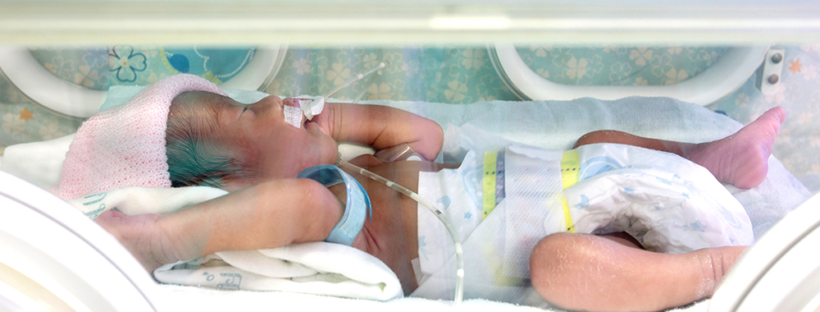by, Rosemary C. White-Traut, PhD, RN, FAAN
Having your new baby spend time in the Neonatal Intensive Care Unit (NICU) can be extremely stressful for both you and your baby. The bright lights, the random nature of nonhuman sounds such as beeps or monitors, and medical procedures can all create an uneasy or stressful environment.
This is concerning because stress can influence your baby’s brain development and how parents interact with their babies. However, there are ways to help reduce the long-term effect of these stressors.
There are several things you can do as parents to help reduce NICU environmental stressors. Ask your nurse for help with these suggestions.
First is to reduce extra lightings and non- human sounds. Infants thrive on the mother and father’s voice. Talking to your baby is easy to do. Mothers and fathers instinctively raise the pitch of their voice and talk using a few words with a pause.
Another way to help babies in the NICU is to use a combination of procedures that can increase your understanding of and reactions to your infant’s behaviors; along with, providing your infant with positive sensory experiences. This procedure is known as Auditory, Tactile, Visual, and Vestibular Intervention (ATVV) also known as Massage Plus 30, 10, 5.
This practice helps to improve infant/parent relationships, increase infant alertness and pre-feeding behaviors, improve maternal confidence in caring for her premature infant,, and improve the baby’s ability to feed and grow. Touch and human social interaction are important for an infant’s growth and development, and during the first few days or weeks of life babies are very sensitive to and receptive to these types of stimuli.
One mother delivered a baby born at less than 29 weeks gestation. After she learned the ATVV and administered it for a few weeks, she stated “The ATVV made me more aware as a mother of what my child may like or dislike and to how recognize the difference.”
The ATVV procedures were developed over a 30 year period and include step by step instructions on how to introduce the sensory stimuli in a way that does not over stimulate the baby. The procedure begins with mom (or dad) talking to baby in a soothing calm voice (auditory stimulation). After 30 seconds of talking to the baby using a higher pitched voice and a few words with pauses, mom can then begin to massage the baby. Mom will massage each section of baby’s head, arms, legs, tummy and back, for 10 minutes. This is considered touch or tactile stimulation. Mom should continue to talk to baby and hold eye contact throughout the massage. Once the massage is finished mom should wrap baby up in a blanket and gently rock baby back and forth for 5 minutes (vestibular stimulation). Throughout this procedure mom should be watching for signs that baby is alert and enjoying themselves. A full instruction on how to do the ATVV protocol and tips to help understand your baby’s behavior can be found online.
Another mother had previously delivered more than three premature babies. When she learned the ATVV for the first time on her baby who was born at 33 weeks gestation, she stated “I have never seen her so alert!”
Before starting any procedure like ATVV it is important to discuss the benefits and drawbacks with your healthcare professional, as each baby’s needs and situation is different. Work with hospital nurses, physicians, and other staff to help find ways to help reduce environmental stressors for your baby during their stay in the NICU. They will be able to help facilitate your activities with your baby during visits such as the ATVV or skin-to-skin contact, reducing lighting and sound exposure, and supporting non stress feedings.
No parent wants their new baby to be in the NICU in their first few days or weeks of life. However, for some with medical conditions and for those born too early, the NICU is the best place to be. Finding ways to help reduce your baby’s stress when placed in the NICU environment can have long lasting impacts on your baby’s development.
 Rosemary C. White-Traut, PhD, RN, FAAN
Rosemary C. White-Traut, PhD, RN, FAAN
Rosemary is the director of Nursing Research at Children’s Hospital of Wisconsin. Prior to coming to the Children’s Hospital of Wisconsin, she served as professor and department head of Women, Children and Family Health Science at the University of Illinois at Chicago.

